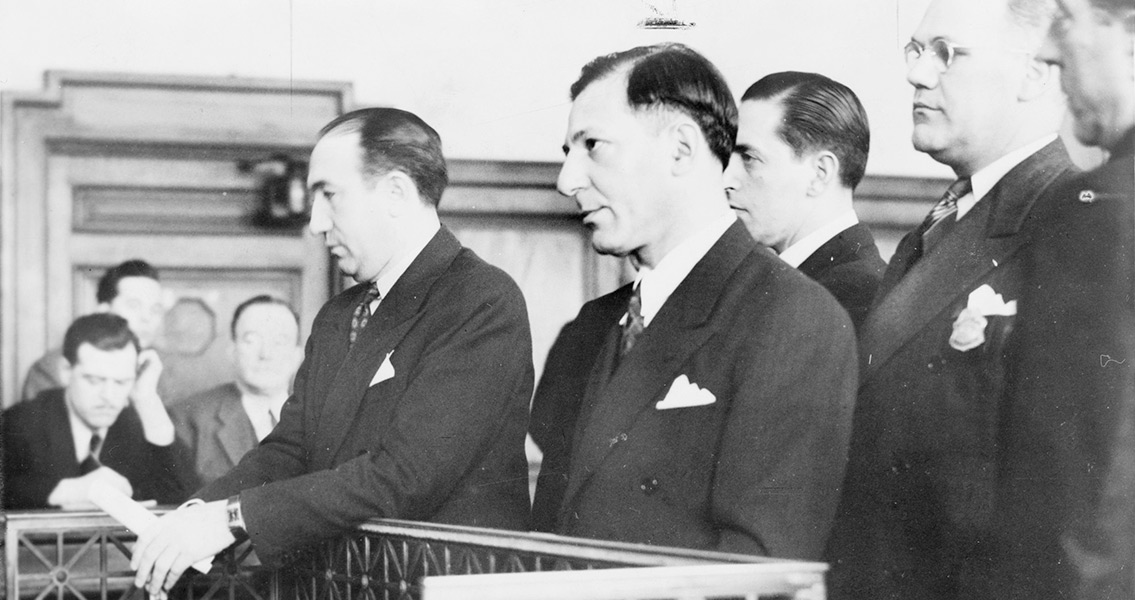<![CDATA[On March 4th 1944, one of the most notorious crime bosses in US History was executed by electric chair at Sing Sing Prison in New York. Louis "Lepke" Buchalter's execution gave him the distinction of being the only US mob boss to receive the death penalty from the US Government. Born in the Lower East Side of Manhattan in February 1897, Buchalter's family were Jewish immigrants from Eastern Europe. His mother gave him the nickname "Lepkeleh", which means 'little Louis' in Yiddish, it was later shortened to "Lepke". Following the death of his father and his mother moving to Arizona for health reasons, Lepke was left in the care of his sister in New York. The time spent in his sister's care saw Buchalter's first involvement with crime. In September 1915, he was arrested for burglary and assault, although the case was discharged. In February 1916 ,he was again arrested for burglary, and sentenced to a juvenile offenders institute until July 1917. In September 1917, he was sentenced to 18 months in the state prison at Sing Sing in New York (the very same prison in which he would be killed decades later). Following his release in January 1919, he was arrested and sentenced again a year later, this time to a 30 month sentence. Following his release from prison in 1922, Buchalter moved into the world of organised crime with his fellow youthful crook Jacob "Gurrah" Shapiro. The two supposedly met after both attempted to rob the same pushcart, they quickly decided to pool their resources in order to extort Manhattan's pushcart owners. Establishing themselves through their extortion and protection businesses, they eventually joined Jacob Orgen's gang. Lepke terrorised New York's garment workers, taking control of the city's textile unions and receiving bribery payments from both employers and the union members. As the 1920s wore on, Lepke's reputation and presence in the New York underworld continued to grow, and he turned his attention to alcohol bootlegging, illegal gambling and ultimately, the narcotics trade. In many ways, Louis Buchalter was representative of a drastic change taking place in the world of American organised crime during this period. Buchalter was of Jewish origin, but he was not restricted to just working with members of New York's Jewish community. He was a member of the large Mafia concern run by Charles Luciano, who in turn had a close business relationship with Mayer Lansky, a gangster from a Russian Jewish family. Whereas the early twentieth century had seen criminal organisations in the USA split along ethnic grounds, by the 1930s it was increasingly common for the old racial prejudices between different ethnic groups to be set aside for mutual financial gain. Buchalter's notoriety came from his running of an organisation of hired killers, which later came to be known as 'Murder Inc.', in reference to the business like approach it took to killing. Murder Inc. made profit through killing troublesome gangsters within the mob, as well as eliminating eye witnesses to the mob's crimes. Inevitably, it is difficult to determine exactly how many hit men were on the organisation's pay roll, and how many deaths it was responsible for, but it made Buchalter one of the most powerful gangsters in the United States. The details of his arrest in 1939 are particularly interesting. Up until then he had used bribery and intimidation to keep himself free from the authorities. However, in August, word was received by the FBI that he was willing to surrender, if a deal could be struck. On 24th August, he arranged to meet FBI Director J. Edgar Hoover to hand himself in. Although Buchalter was arrested before he reached the agreed meeting spot, he was brought to Hoover, and taken away in the director's black limousine. Buchalter initially escaped the death penalty, instead being sentenced to just 14 years in prison for narcotics offences, with his links to Murder Inc. initially being overlooked. Exact details of the deal he struck with Hoover are unknown, but the benefits did not last long. Buchalter was eventually turned over to New York authorities, run by District Attorney Thomas Dewey, who had vowed to give Buchalter the death penalty. Buchalter was eventually betrayed by Abe Reles, a mobster who had become an informant. Reles implicated Buchalter in four murders, and in December 1941 the boss of Murder Inc. was sentenced to death. Conspiracy theories surround the decision to execute Buchalter. When he was first arrested, the Chicago Tribune published an article claiming Buchalter had only avoided the death sentence because he had made a deal to keep silent about links between the Roosevelt administration and Murder Inc. These conspiracy theories had further weight attached to them after Buchalter's execution was delayed by two days. Officially, the delay was the result of a final appeal by Buchalter's attorney, relating to the procedures of Buchalter's arrest and trial. At the time however, New York's newspapers speculated that Buchalter had more information to reveal. In particular, this related to Sidney Hillman, a member of Roosevelt's administration. Hillman was also president of the Amalgamated Clothing Workers of America. Buchalter's earlier involvement with garment workers' unions led some to theorise that he could have held incriminating information on Hillman. Information which would have inevitably proved damaging to the whole Roosevelt administration. Despite the delay, Buchalter was put to the electric chair on 4th March 1944. The anniversary of his death provides a timely reminder of the prominence of organised crime in the United States in the 1930s and 1940s, and how entwined criminality became with US society and politics.]]>
Louis "Lepke" Buchalter Gets the Chair
